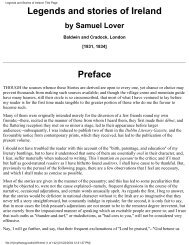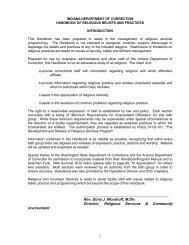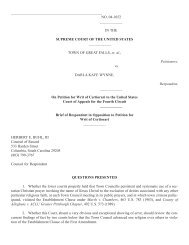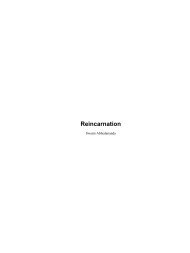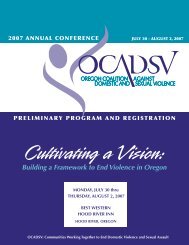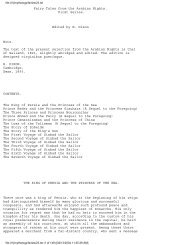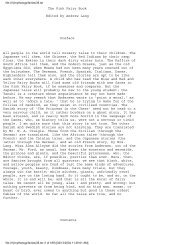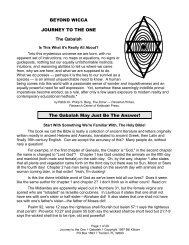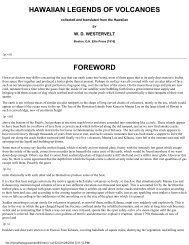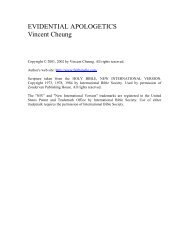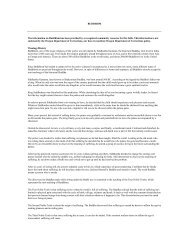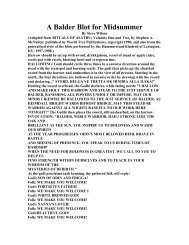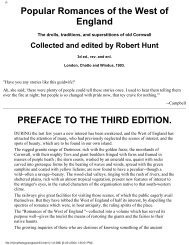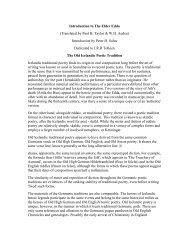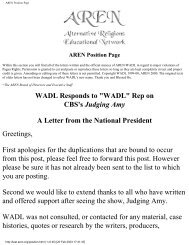You also want an ePaper? Increase the reach of your titles
YUMPU automatically turns print PDFs into web optimized ePapers that Google loves.
en t'et t'etta<br />
forever.'[2]<br />
aha uab-k uab ka-k uab ba-k uab sexem-k<br />
Thou art pure, thy ka is pure, thy soul is pure, thy form is pure.[3]<br />
The ka, as we have seen, could eat food, and it was necessary to provide food for it. In the XIIth dynasty<br />
and in later periods the gods are entreated to grant meat and drink to the ka of the deceased; and it seems<br />
as if the Egyptians thought that the future welfare of the spiritual body depended upon the maintenance<br />
of a constant supply of sepulchral offerings. When circumstances rendered it impossible to continue the<br />
material supply of food, the ka fed upon the offerings painted on the walls of the tomb, which were<br />
transformed into suitable nourishment by means of the prayers of the living. When there were neither<br />
material offerings nor painted similitudes to feed upon, it seems as if the ka must have perished; but the<br />
texts are not definite on this point.<br />
A prayer of the ka.<br />
The following is a specimen of the ka's petition for food written in the XVIIIth dynasty:--<br />
"May the gods grant that I go into and come forth from my tomb, may the Majesty refresh its shade, may<br />
I drink water from my cistern every day, may all my limbs grow, may Hapi give unto me bread and<br />
flowers of all kinds in their season, may I pass over my estate every day without, ceasing, may my soul<br />
[1. ###. l. 483.<br />
2. Recueil de Travaux, t. v., p. x 66, 1. 67.<br />
3 Ibid., 1. 112.]<br />
{p. lxiv}<br />
alight upon the branches of the groves which I have planted, may I make myself cool beneath my<br />
sycamores, may I eat the bread which they provide. May I have my mouth that I may speak therewith<br />
like the followers of Horus, may I come forth to heaven, may I descend to earth, may I never be shut out<br />
upon the road, may there never be done unto me that which my soul abhorreth, let not my soul be<br />
imprisoned, but may I be among the venerable and favoured ones, may I plough my lands in the Field of<br />
Aaru, may I arrive at the Field of Peace, may one come out to me with vessels of ale and cakes and bread<br />
of the lords of eternity, may I receive meat from the altars of the great, I the ka of the prophet Amsu."[1]<br />
The ba or soul.<br />
To that part of man which beyond all doubt was believed to enjoy an eternal existence in heaven in a<br />
state of glory, the Egyptians gave the name ba, a word which means something like "sublime," "noble,"<br />
and which has always hitherto been translated by "soul." The ba is not incorporeal, for although it dwells<br />
in the ka, and is in some respects, like the heart, the principle of life in man, still it possesses both<br />
substance and form: in form it is depicted as a human-headed hawk, and in nature and substance it is<br />
stated to be exceedingly refined or ethereal. It revisited the body in the tomb and re-animated it, and<br />
conversed with it; it could take upon itself any shape that it pleased; and it had the power of passing into<br />
heaven and of dwelling with the perfected souls there. It was eternal. As the ba was closely associated<br />
file:///I|/mythology/egypt/1/1.html (50 of 189) [01/25/2004 3:29:58 PM]



